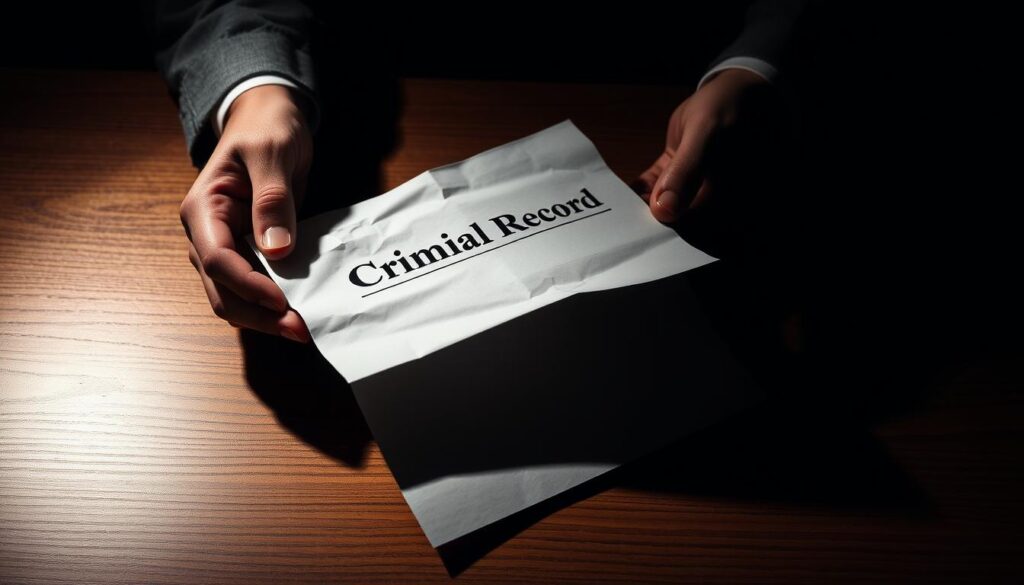Over 4 million Canadians live with a permanent mark that affects their daily lives. Contrary to popular belief, legal history in Canada doesn’t vanish like a forgotten memory. The Royal Canadian Mounted Police (RCMP) maintains these details indefinitely through the Canadian Police Information Centre (CPIC). This system shares data with law enforcement, border agencies, and employers nationwide.
Many assume penalties fade with time, but convictions remain visible unless actively addressed. This creates lifelong barriers to jobs, travel, and housing. While some countries have “expungement” timelines, Canada’s framework requires legal intervention to restrict access to this information.
Understanding how the justice system manages historical data helps you make informed choices. This guide clarifies myths about automatic clearance and explains practical steps for moving forward. You’ll learn why certain opportunities remain blocked without proper documentation changes.
Knowledge of legal processes empowers better decisions about your future. From professional licensing to international travel, unresolved matters can resurface unexpectedly. Let’s explore how to navigate these challenges within Canada’s unique legal landscape.
Understanding Criminal Records in Canada
From minor infractions to serious offences, Canada’s justice system meticulously documents all encounters with authorities. These legal profiles include arrests, dropped charges, and court outcomes – not just convictions. The Royal Canadian Mounted Police (RCMP) stores this data indefinitely through the Canadian Police Information Centre (CPIC).

What Constitutes a Legal History?
A person’s legal footprint contains fingerprints, photographs, and DNA samples collected during investigations. Even dismissed charges or withdrawn cases appear in these files. Records also track probation terms, arrest warrants, and incarceration periods.
| Offence Category | Examples | Recording Duration |
|---|---|---|
| Violent Crimes | Assault, robbery | Indefinite |
| Property Crimes | Theft, arson | Indefinite |
| Traffic Violations | DUI, reckless driving | Indefinite |
National Data Management Practices
Authorized agencies across Canada and U.S. border officials access CPIC records daily. Law enforcement uses this centralized system during background checks, employment screenings, and border crossings. Unlike some countries, Canada doesn’t automatically hide old entries – they remain visible without legal intervention.
Understanding these management protocols explains why unresolved matters affect opportunities years later. Proactive measures become essential for limiting access to sensitive information.
does your criminal record clear after 7 years in canada
Many believe legal histories fade like old documents gathering dust. This dangerous assumption leads to critical errors in personal and professional planning. Canada’s justice system maintains permanent records through the RCMP’s CPIC database – a reality requiring proactive management.

Clarifying the 7-Year Misconception
The seven-year myth often confuses credit reporting rules with criminal law. Unlike financial histories, legal entries remain active for life. Minor offences like shoplifting or trespassing receive no expiration dates. Even dismissed charges appear in background checks without formal removal.
CPIC retains information until individuals turn 80. Law enforcement accesses these files during routine stops or job screenings. Time alone never erases entries – only legal processes like pardons alter visibility.
This misunderstanding creates false security. People might apply for jobs or cross borders unaware of lingering consequences. Employers discovering undisclosed histories often revoke offers permanently.
Recognizing this permanence helps avoid life-altering mistakes. Proactive steps become essential for those seeking housing, careers, or international travel. Legal pathways exist, but automatic clearance remains fiction in Canadian law.
Legal Processes: Record Suspension, Discharge, and Expungement
What legal pathways exist for managing past convictions in Canada? Three key mechanisms offer varying levels of relief: record suspension, discharge, and expungement. Each option carries distinct eligibility requirements and legal effects.

Record Suspension and Pardons Explained
The Parole Board of Canada administers record suspensions, formerly called pardons. For summary offences like minor theft, you become eligible five years after completing your sentence. Indictable offences like assault require a ten-year waiting period.
Applications demand thorough documentation, including court records and proof of sentence completion. A $50 processing fee applies, with decisions taking up to two years. Successful applicants gain restricted access to their files, though law enforcement retains visibility.
Comparing Expungement and Sealing Your Record
Discharges automatically seal files without applications. Absolute discharges hide records after one year, conditional discharges after three. These apply only to non-conviction outcomes where courts deemed punishment unnecessary.
Expungement permanently destroys entries but remains rare. Reserved for historical injustices like outdated morality laws, it requires meeting strict criteria under federal legislation. Most applicants pursue suspensions instead.
| Option | Offense Type | Waiting Period | Visibility |
|---|---|---|---|
| Record Suspension | Summary/Indictable | 5-10 years | Limited access |
| Expungement | Historical injustices | None | Permanent deletion |
While suspensions improve opportunities, border agencies and police can still view sealed records during security screenings. Legal counsel helps determine the best approach for your situation.
Impacts of Criminal Records on Your Life
The ripple effects of past convictions extend far beyond the courtroom. Legal entries create barriers affecting careers, family dynamics, and international mobility. These challenges persist until you take formal steps to address them.

Employment and Professional Licensing Challenges
Background checks routinely block opportunities in healthcare, education, and finance. Licensing boards often reject applicants with theft or assault charges. Even volunteer roles involving children require clean histories.
Some industries enforce strict policies:
- Medical fields deny licensure for drug-related offences
- Security sectors bar applicants with violent crimes
- Financial institutions refuse those with fraud records
Travel, Immigration, and Border Implications
Border agents routinely access CPIC data when scanning passports. A single DUI conviction can trigger U.S. entry denials. Non-citizens face deportation risks for minor offences like traffic violations.
Family courts also review legal histories during custody disputes. Adoption agencies may prioritize applicants without convictions. Educational programs in law enforcement or childcare often reject students with unresolved cases.
Proactive management of your legal profile remains critical for rebuilding opportunities. Each sector applies unique rules, making tailored solutions essential.
Prevention and Defence Strategies to Avoid a Permanent Record
Facing charges? Immediate action shapes outcomes more than waiting ever could. Legal experts stress that strategic defence planning during early stages often prevents lifelong consequences. Every hour matters when building protection against permanent entries in national databases.

Why Timing Changes Everything
Contacting counsel within 24 hours of charges dramatically improves case trajectories. Lawyers review evidence flaws, witness credibility, and procedural errors that could dismantle accusations. “Delays often erase critical defence opportunities,” notes a Mass Tsang criminal law specialist. Their team has secured non-conviction resolutions for 72% of clients through prompt interventions.
Transforming Outcomes Through Advocacy
Skilled representation negotiates alternatives to traditional convictions. Recent cases show:
| Strategy | Result | Impact |
|---|---|---|
| Evidence challenges | Dismissed charges | No entry created |
| Plea negotiations | Conditional discharge | Record sealed in 3 years |
| Pre-trial motions | Reduced offences | Lower penalties |
Absolute discharges leave no lasting marks when secured early. Prosecutors sometimes withdraw charges if defence teams demonstrate flawed police work or unreliable testimonies. Even impaired driving cases can avoid criminal entries through provincial offence negotiations.
“Preventing a record isn’t about luck – it’s about building an airtight case before prosecutors solidify their position.”
Investing in robust legal defence preserves career paths and travel freedoms. While suspension processes help existing records, avoiding convictions entirely skips years of bureaucratic hurdles. Your future opportunities depend on today’s strategic choices.
Conclusion
Navigating Canada’s justice system demands clarity about permanent legal histories. Unlike credit reports, criminal records never expire automatically – they linger indefinitely without formal interventions. This reality reshapes how people approach employment, travel, and housing opportunities.
Three pathways exist for managing these entries: suspensions limit access, discharges seal non-conviction outcomes, and expungement erases outdated injustices. Each requires meeting strict criteria through legal processes. Time alone cannot resolve these matters – proactive steps prove essential.
Early legal guidance often prevents lifelong consequences. Skilled advocates negotiate alternatives to convictions during initial charges, preserving future options. Once established, records create barriers that intensify over decades, affecting professional licensing and international mobility.
Understanding this system empowers informed decisions. Whether seeking record suspension or building defence strategies, professional support remains critical. Your choices today directly influence opportunities for years ahead.

